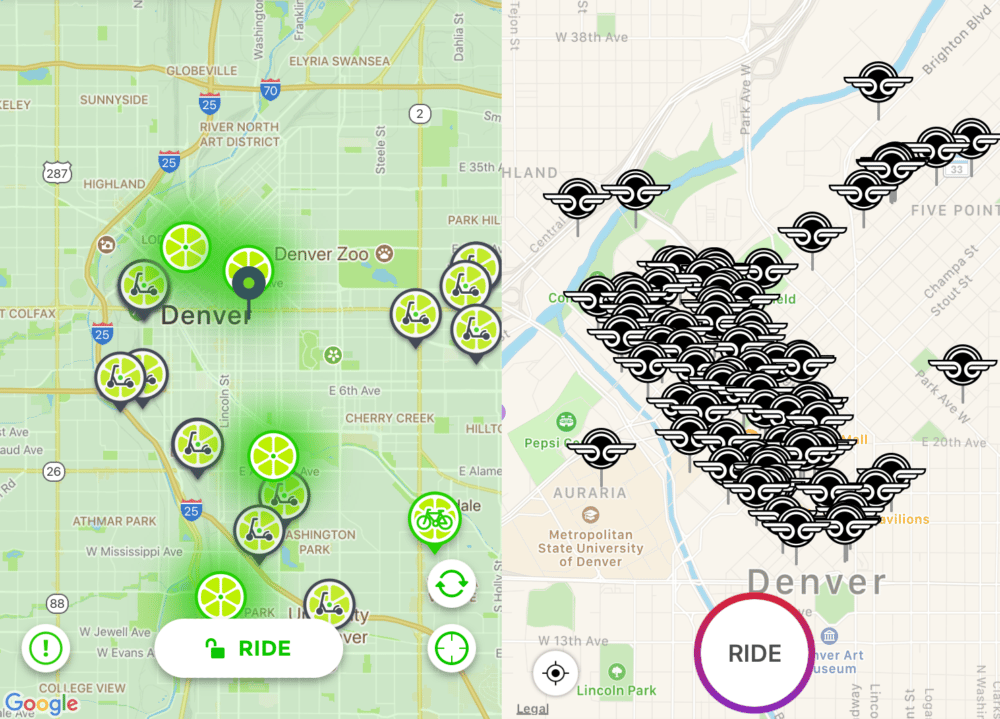Last week, two companies deployed fleets of electric rental scooters that quickly spread through Denver's streets. Suddenly, people were cruising down sidewalks and streets on the two-wheelers and parking them just about everywhere.
Call it a case of "disrupt first, ask questions later."
Well, now the city of Denver is asking questions. On Friday, the local public works department ordered Lime and Bird to get their "dockless" scooters out of Denver's public spaces. Officials said they were concerned about the "use, placement and quantity of scooters."
But the two-wheel debate of 2018 is only beginning, and the city has indicated that it may create rules that allow the scooters to operate here.
Four days later, the city is still full of scooters.

While Lime has received the most attention, it appeared that Bird had many more active scooters. And it appears that neither company is in compliance with the city's orders.
"I don’t believe anyone in Denver Public Works has heard from Lime since we gave them notice last Friday," wrote Nancy Kuhn, spokesperson for DPW, in an email to Denverite on Monday. Failure to comply could result in citations and fees, she said.
The city's crews are already removing some unattended scooters. In fact, a number of Lime scooters have passed through a city building, according to GPS data in the Lime app. But the city is only picking them up "to the extent its resources allow."
A representative from Lime did not answer questions about whether the company would remove the scooters itself. Spokesperson Mary Caroline Pruitt said that the company had "reached out" to the city about the "notification of confiscation of our scooters."
The company wants "to better understand the reasoning behind taking them off the streets" and is searching for ways to "effectively and efficiently partner on next steps," she wrote.
Meanwhile, the city also could take action against riders. The city's laws only allow the scooters to operate on the sidewalks, and not on bike lanes and trails or in parks. Lime's scooters cap out at about 15 mph.
It's not over for scooters.
The city is working now to create rules for dockless transportation companies, Kuhn said. They could be introduced in a matter of weeks or months, potentially giving operators a legal way to keep their scooters in the city's public spaces.
What are the pros and cons?
Plenty of people have complaints. Maybe you've tripped over one, or seen one abandoned in a creek. Maybe you've been surprised by some kid swinging around the sidewalk corner of 11th and Bannock. (Me. I was scared.) In China, companies got so overambitious that cities were left with enormous piles of unused bikes.
But plenty of others -- maybe even a majority of the dozens of online comments I reviewed -- showed that people were interested and excited about the new idea.
"People can be frightened of things until they see it’s there, and how they can integrate it in their lives," said Councilwoman Mary Beth Susman, who focuses on mobility.
By the way: They're called dockless because they don't have to charge at docks. Instead, the vehicles are charged by people paid by the companies. They're unlocked with mobile apps.
The answer might be to create better places for people to store and ride these small vehicles, Susman said. "Will it take us building stands or some sort of thing, or requiring them to place them in corrals?" she asked.
The companies themselves also say they're open to suggestions. For example, Bird has introduced a feature in some cities that asks users to submit a photo of where they left the scooter, hoping to encourage better behavior.
For some mobility advocates, the whole thing points to the need for streets that are friendlier to bikes and other things that aren't cars -- so people don't have to ride on the sidewalks. (Wired makes an interesting case for this.)
"We’ve taken up so much space for cars that we have neglected spaces for people," Susman said. "Now is the time that shows how much more space we need for people."
Other cities are dealing with similar scooter struggles.
In San Francisco, the city just ordered the dockless companies to temporarily cease operations and apply for permits, according to the San Francisco Chronicle. In response, the companies have put the vehicles in storage.
San Francisco wants the companies to keep the scooters from being parked on the sidewalks, and it will cap the number of scooters that are allowed in the city, the Chronicle reported. They're also asking the companies to provide insurance coverage and offer access to low-income riders.
Los Angeles also is debating potential new rules, and Austin has a new program to manage bikes and scooters.
Meanwhile, investors see major potential. Bird has reportedly raised $150 million and is valued at $1 billion. And this might foreshadow even more debates about the use of Denver's streets. Driverless delivery bots, anybody?












